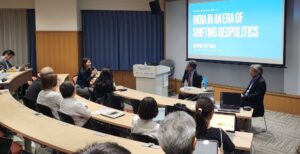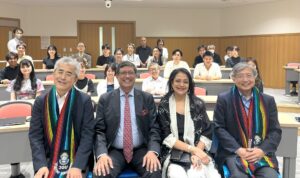
On June 6, 2025, GraSPP hosted a research seminar titled “India’s foreign policy in an era of shifting geopolitics,” featuring Ambassador Sanjay Bhattacharyya, Professor of Diplomatic Practice at the Jindal School of International Affairs of O.P. Jindal Global University in India. Prof. Chiyuki Aoi, Director of the Strategic Communications Education and Research Unit (SCERU) at GraSPP, and Prof. Toshiro Nishizawa from the UTokyo College of Design Planning and Coordination Office, took the lead, supported by the Global Network Project to Promote Study in Japan (South Asia Regional Office). Prof. Yujin Yaguchi, Director of the Center for Global Education (UTokyo GlobE), also attended the seminar. A team of GraSPP student volunteers, Cynthia Solenn Pagliccia, Soo Yeon Yoo, and Wanonno Iqtyider, supported the seminar organization. GraSPP and the Strategic Communications Education and Research Unit (SCERU) sincerely thank Prof. Sanjay Bhattacharyya for his visit to share insightful views on India’s foreign policy in an era of shifting geopolitics and his vision for enhancing India-Japan strategic partnerships.
Talk summary
Ambassador Sanjay Bhattacharya discussed India’s foreign policy adjustments in the era of shifting geopolitics, emphasizing the importance of partnerships over alliances. He highlighted key historical moments, including Prime Minister Shinzo Abe’s 2007 visit to India, the G20’s expansion, and Obama’s 2010 “Pivot to Asia” speech. Prof. Bhattacharya noted India’s economic growth, democratic strengths, and strategic partnerships, particularly with Japan. He underscored the need for multilateral reforms, digital diplomacy, and public diplomacy. He also addressed challenges like climate change, migration, and the rise of China, stressing the importance of cooperation and rule-based global governance.
He suggested exploring opportunities for more deep human contact and exchanges between Indian and Japanese students and faculty, continuing to bridge the geo-economic and geopolitical divide through collaboration at various multilateral forums in the Indo-Pacific region, finding better ways to resolve differences through diplomacy, dialogue, and other peaceful means, and working towards updating global rules and governance structures to address new realities of production and economic interconnectedness.
Talk outline
Prof. Bhattacharya’s journey and personal memories
Prof. Bhattacharya expressed his pleasure in being back in Japan, sharing personal memories of his time in Tokyo. He reflected on India’s adjustment to changing geopolitics over the last few decades, emphasizing the importance of interpreting and taking advantage of opportunities. Prof. Bhattacharya recalled significant events, including Prime Minister Shinzo Abe’s visit to India and the comprehensive strategic partnership between India and Japan. He discussed the G8 outreach and the expansion to the G20, highlighting the importance of financial stability and collaboration between large and emerging economies.
Emerging economies and multilateralism
Prof. Bhattacharya explained the rise of emerging economies and their need for more space in economic activities and diplomatic initiatives. He discussed the challenges faced by multilateral institutions like the United Nations and the need for reform; emerging economies formed plurilateral groups and new institutions to address global governance and financial stability. Prof. Bhattacharya emphasized the shift from alliances to partnerships, focusing on mutual interests and equality.
Technological disruptions and public opinion
Prof. Bhattacharya highlighted the impact of technological disruptions on diplomacy and public policy, requiring constant innovation and adaptation. He discussed the growing importance of public opinion and the need to integrate public views into policy making. He added that non-traditional threats such as climate change, migration, and human rights issues had become significant factors in diplomacy and the role of non-state actors, including corporates and civil society, in global governance was emphasized.
Digital diplomacy and public diplomacy
Prof. Bhattacharya introduced the concept of digital diplomacy, using digital resources for real-time interaction and policy initiatives. He discussed that public diplomacy should focus on creating communities with shared values, despite diversity, and the churn in the multilateral system and the emergence of new institutions like ASEAN and BRICS. Prof. Bhattacharya emphasized the importance of understanding the diversity in global governance and the need for flexible approaches.
India’s development and global engagement
Prof. Bhattacharya outlined India’s development, including its democracy, high growth rate, and young population. He discussed India’s integration into global supply chains and the empowerment of its citizens. Prof. Bhattacharya touched on India’s three-step process towards engagement of developing capacity, making it possible, and ensuring willingness and India’s humanitarian assistance and disaster relief efforts as examples.
India’s foreign policy and multilateralism
Prof. Bhattacharya explained India’s foreign policy, including its Look East policy, Act East policy, and Link West policy and stressed India’s commitment to multilateralism and its engagement with the United Nations and other international organizations. He highlighted the importance of BRICS and the G20 in bridging the gap between emerging and developed economies and emphasized the Indo-Pacific as a key region for future advancement and stability.
India-Japan relationship and economic collaboration
Prof. Bhattacharya discussed the strong and stable relationship between India and Japan, emphasizing their shared values and economic collaboration. He highlighted the Delhi-Mumbai Industrial Corridor and other projects supported by Japanese assistance. He emphasized the importance of deep human contact and cultural exchanges between India and Japan. Prof. Bhattacharya mentioned the role of Japanese students and faculty in India and the development of Japanese language skills among Indian students.
Challenges and opportunities in global governance
Prof. Bhattacharya addressed the challenges of geopolitical flux, disruptive forces, and unpredictability in global politics. He discussed the rise of China and its assertiveness, the need for cooperation, and the impact of conflict situations around the world. He emphasized the importance of rulemaking in global governance and the need for updated rules to reflect new ways of production. Prof. Bhattacharya concluded on an optimistic note, highlighting the potential for India and Japan to be pathfinders in creating a new paradigm for global governance and innovation.
A dialogue with participants

The discussion focused on India-Japan relations, highlighting the consistent foreign policy initiatives since the Narasimha Rao era. Key points included the significant increase in Japanese investments, cultural exchanges, and technological collaborations, such as the IIT Hyderabad. The QUAD’s expansion to include Africa was emphasized, aiming to foster a free and open Indo-Pacific. The conversation also addressed the balance between competition and cooperation between India and Japan, particularly in new industrial sectors. The need for a constructive engagement with China was discussed, stressing the importance of rule-based order and mutual benefits. Issues raised include ways to explore further collaboration between India and Japan on cultural and technological fronts, the need to continue discussions on the QUAD initiative and its expansion towards Africa, and a rationale for maintaining a constructive and productive relationship with China, while calling out any contradictory activities.


